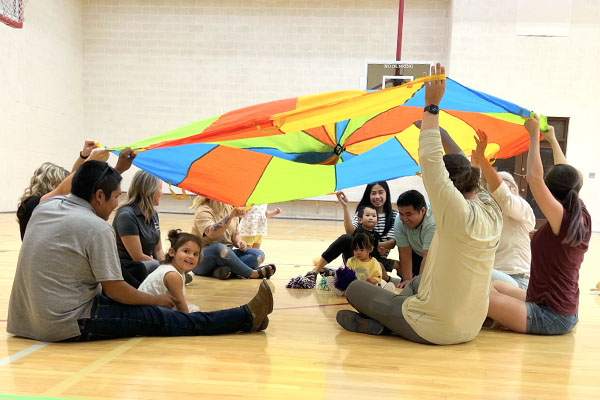Southeast Early Intervention Serves Grand County Children

Parents and children play during a Southeast Early Intervention Program activity.
By Audrey Graham, child development specialist with the Institute for Disability Research, Policy & Practice at Utah State University-Moab.
Reprinted with permission from the Moab Times-Independent.
Southeast Early Intervention is part of the Institute for Disability Research, Policy & Practice, which is 50 years old this year. We’re celebrating 50 years of improved lives for children and families in rural Utah.
Juan and Carrie (not their real names) brought their newborn son home to Moab with excitement and trepidation. Their child had been in Newborn Intensive Care for two months and they were nervous about how to handle his special needs in our rural area.
Would they be able to help him when they live so far from services that are available on the Wasatch Front? How would they help him learn, or know if he needed special therapy? Would the local school district be equipped to handle a wheelchair? Would one of them need to quit work to care for him? Would they need to move to a bigger city? Their heads were spinning.
Luckily their high-risk pediatrician on the Wasatch Front knew about the nationwide Early Intervention Program and referred them to Southeast Early Intervention in Moab.
Within days of bringing their new baby home, Carrie received a phone call from the team at Southeast Early Intervention. She was thrilled that visits could begin within the week and that they could be in her home, since taking her baby out was daunting. Even better, the visits would be provided on a sliding scale, so were affordable even if needed several times each month. She learned that if needed the visits would even be free, a huge relief with all the medical bills they were facing. She couldn’t wait to talk over all the unexpected things they were facing with people who could help.
Early Intervention is a federally funded program helping families whose newborn to age 3 children have special needs or are at risk for delayed development for any reason. Each state determines which agency will manage Early Intervention services for our tiniest residents. Locally it is Utah State University, through the Institute for Disability Research, Policy, and Practice that provides services to Grand, Emery and Carbon counties.
Working through the Emma Eccles Jones College of Education and Human Services, the institute is celebrating its 50th year of operation this year. In addition to supporting South East Early Intervention, they also provide services in Cache, Rich and Box Elder counties.
Southeast Early Intervention serves approximately 100 infants and toddlers at any given moment, which is about 10% of the three-county infant and toddler population. This is on par with national ratios of children with special needs.
Ideally with intervention almost 40% of these children will not need further special help by age 5. Some of “our” children move on to the Special Needs Preschool with the local school district and others graduate and no longer need special services after age 3.
In Juan and Carrie’s case, their son continued to need extra help at age three. Early Intervention helped transition him to the Grand County School District’s Classroom #1, where teacher/child ratios are low and he had extra help with his speech and self-care needs for two years before kindergarten.
He now attends first grade with extra supports and loves riding the bus and playing with his peers. Carrie and Juan are very involved in advocating for their son’s needs and they credit early intervention with helping them know their rights and cope with the unknown for the first three years of their child’s life.
EIP can help children with diagnosed conditions such as Down Syndrome or cerebral palsy, or those with less noticeable speech delays, vision or hearing problems or behavior challenges. Children who have experienced trauma, which may include anything from divorce, to foster care, to having a parent in jail, are able to be served if they are struggling and falling behind in milestones.
In fact, these children often have great outcomes when we are able to identify and help their families.
Our work is full of great joy, as well as helping parents grieve and cope when their child is found to need extra help.
We provide emotional support as well as practical knowledge, and coach parents as needed with special equipment, speech, and physical therapies. Our team works remotely with specialists in other areas and keeps the entire family involved through home visits, trips to library, pool, and parks and practical tips for each individual child.
To learn more about Southeast Early Intervention, or to refer a child, please contact us at 435-259-1114 or visit our website at idrpp.usu.edu/seeip.

